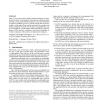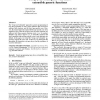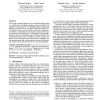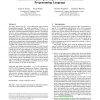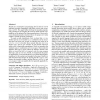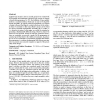ICFP
2005
ACM
14 years 11 months ago
2005
ACM
MLF is a type system that extends a functional language with impredicative rank-n polymorphism. Type inference remains possible and only in some clearly defined situations, a loca...
ICFP
2005
ACM
14 years 11 months ago
2005
ACM
The `Scrap your boilerplate' approach to generic programming allows the programmer to write generic functions that can traverse arbitrary data structures, and yet have type-s...
ICFP
2005
ACM
14 years 11 months ago
2005
ACM
We describe a monadic interface to low-level hardware features that is a suitable basis for building operating systems in Haskell. The interface includes primitives for controllin...
ICFP
2005
ACM
14 years 11 months ago
2005
ACM
This paper explains how the high-level treatment of datatypes in functional languages--using features like constructor functions and pattern matching--can be made to coexist with ...
ICFP
2005
ACM
14 years 11 months ago
2005
ACM
This paper defines PolyAML, a typed functional, aspect-oriented programming language. The main contribution of PolyAML is the seamless integration of polymorphism, run-time type a...
ICFP
2005
ACM
14 years 11 months ago
2005
ACM
Monads are commonplace programming devices that are used to uniformly structure computations with effects such as state, exceptions, and I/O. This paper further develops the monad...
ICFP
2005
ACM
14 years 11 months ago
2005
ACM
Recent research has shown how boilerplate code, or repetitive code for traversing datatypes, can be eliminated using generic programming techniques already available within some i...
ICFP
2005
ACM
14 years 11 months ago
2005
ACM
Applied Type System (ATS) is recently proposed as a framework for designing and formalizing (advanced) type systems in support of practical programming. In ATS, the definition of ...
ICFP
2005
ACM
14 years 11 months ago
2005
ACM
ML modules and Haskell type classes have proven to be highly effective tools for program structuring. Modules emphasize explicit configuration of program components and the use of...
ICFP
2005
ACM
14 years 11 months ago
2005
ACM
Proof-carrying code (PCC) is a general framework that can, in principle, verify safety properties of arbitrary machine-language programs. Existing PCC systems and typed assembly l...
